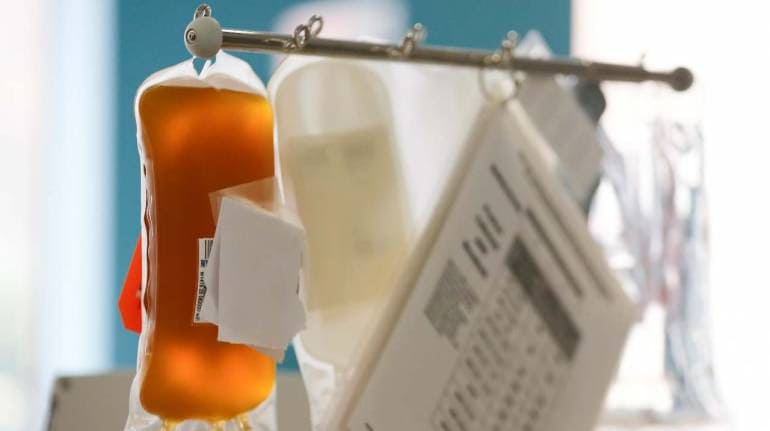
The convalescent plasma therapy, which is being investigated as a treatment for COVID-19, is once again in the spotlight as a top public health care institution in the country has found promising results.
Sawai Man Singh (SMS) Medical College in Jaipur, the main public health institution that's leading Rajasthan's efforts in combating COVID-19, said it has successfully treated three COVID-19 patients using convalescent plasma therapy. All three patients have shown clinical improvement, according to the hospital.
Earlier, Max Hospital in Delhi reported that a patient was successfully treated using this therapy. Till date, there is no specific treatment that has been proven to be effective for SARS-CoV-2 infection. While it's too early to say anything conclusive, the therapy is showing some promise, according to health experts.
"So far, we have conducted three successful COVID plasma therapies and all of them are showing improvement in their clinical state, oxygen saturation and d-dimer levels," Dr Sudhir Bhandari, Senior Professor of Medicine and Principal and Controller of SMS Medical College, told Moneycontrol.
"All this is being done as per the ICMR protocol and with the permission of the Drug Controller General of India (DCGI). The dose required is 200ml of plasma on two consecutive days,” Bhandari said.
The convalescent plasma therapy uses antibodies from the blood of a recovered COVID-19 patient to treat those critically affected by the virus. It was one of the procedures that have been investigated by ICMR to find out whether it could be used to treat COVID-19 patients.
SMS medical team will be submitting data to ICMR once they complete plasma therapy on 20 patients. Out of 20, 10 patients will fall under a control group. Patients under the control group will not receive plasma therapy.
SMS Medical College has so far done the therapy on four patients in the intervention group and two in controlled groups.
As of today, 170 patients are admitted to the hospital with COVID-19, and six patients are on oxygen. SMS Medical College and its affiliate hospitals have 250 ICU beds and 1,000 indoor dedicated COVID-19 beds. Rajasthan reported 107 COVID-19 deaths and 3,814 confirmed cases.
Bhandari says convalescent plasma therapy is scalable.
"The moment a patient requires plasma therapy, we will be ready to give it because we have enough donors registered with us who had recovered from COVID infection," he said.
Across the globe, scientists are busy conducting research for a specific and effective treatment for this disease, and as of now, only supportive care - from oxygen therapy in mild cases to invasive mechanical ventilation in critically ill patients - exists.
Rajasthan has become the fourth state in the country to have successfully tested convalescent plasma therapy. With encouraging results in the initial phase of testing, ICMR will conduct the trial in 21 hospitals to assess the safety and efficacy of convalescent plasma on COVID-19 patients.
The 21 hospitals include five from Maharashtra, four from Gujarat, two each from Rajasthan, Tamil Nadu, Madhya Pradesh and Uttar Pradesh, and one hospital each in Punjab, Karnataka, Telangana and Chandigarh.
The trial will enrol 226 COVID-19 patients in the intervention group who will receive plasma transfusion, and 226 COVID-19 patients in the control group, who will not receive the treatment.
The trial protocol approved by the DCGI states that plasma will be collected from recovered individuals if they are eligible to donate blood after a 28-day symptom-free period. The presence of IGG and IGM antibodies generated against COVID-19 will be assessed in the donor’s samples by rapid tests. Plasma will be extracted from the whole blood. Successful plasma donors can be asked to donate repeatedly but not more than 1,000 ml of plasma can be collected from one donor in a month.
Other interventions
A COVID-19 patient should have a pulse oximeter which keeps a tab on oxygen saturation. If the oxygen level found to be falling, the patient should be moved to a higher centre.
SMS Medical College was one of the first in the country to use a combination of anti-malarial drug Hydroxychloroquine and anti-HIV drugs Ritonvir/Liponvir to treat COVID-19 patients.
All three drugs are widely used and have low side-effects.
"There is no specific drug for COVID-19. It is just a stop-gap arrangement, from a point of no treatment to a point of discovery of specific treatment," Bhandari said.
He said the duration of patients turning from positive to negative for COVID-19 is lesser in the group that received the combination.
Discover the latest Business News, Sensex, and Nifty updates. Obtain Personal Finance insights, tax queries, and expert opinions on Moneycontrol or download the Moneycontrol App to stay updated!
Find the best of Al News in one place, specially curated for you every weekend.
Stay on top of the latest tech trends and biggest startup news.